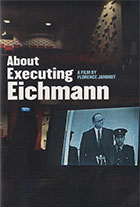
About Executing Eichmann 2014
Distributed by Icarus Films, 32 Court St., 21st Floor, Brooklyn, NY 11201; 800-876-1710
Produced by Pawel Rozenberg and Céline Nusse
Directed by Florence Jammot
DVD , color, 60 min.
College - General Adult
International Crimes, Jewish Holocaust, Genocide, Capital Punishment, Ethics, World War II, Israel, Documentaries
Date Entered: 01/12/2016
Reviewed by Susan J. Martin, Acquisitions Librarian, Texas Woman’s UniversityFlorence Jammot’s riveting documentary, About Executing Eichmann, explores the moral and philosophical questions raised around Adolf Eichmann’s trial and execution. Juxtaposing the two overarching themes of vengeance and justice, the film explores the drama behind the attempt of a group of Jewish intellectuals to spare Eichmann’s life. Using letters, court footage, and eye witness testimonies, Jammot reveals the astonishing true story of Martin Buber, Gershom Scholem, Hannah Arendt, Yehuda Bacon, and others who lobbied Israeli Prime Minister David Ben-Gurion and President Yitzak Ben-Zvi not to execute Eichmann, but rather to commute his sentence.
How can the death of one man atone for the deaths of six million? Did Israel posses the authority to pass judgment on behalf of all the world’s Jews? Since Eichmann’s indictment was (for the most part) crimes against the Jewish people, how could he receive a fair and unbiased trial in Israel? Jammot explores each of these questions interview style, and allows her speakers generous time to make their points. Her choices of commentators make the film.
However, there some short-comings. The film was originally released in French with a dubbed English narration and subtitles for German and Hebrew. This works except for one segment with Hannah Arendt who is speaking in English. After a line or two in English, we hear the French narrator translating Arendt’s speech, and see the English as subtitles. It is an awkward moment in another-wise smoothly edited film. Additionally, there are two important informational omissions: that Eichmann’s trial was the first one to be televised in history and that Eichmann has been the only person in Israeli history to be executed.
Jammot’s film is not for the novice, as it provides little background information. It assumes that the viewer has knowledge of not only the Holocaust and Eichmann’s role in it, but also of the various Israeli statesmen and intellectuals involved. For those who are familiar with these events of the early 1960s, the film is a wonderful work. Particularly moving is the large segment given to painter Yehuda Bacon, an Auschwitz survivor, who conquers his own demons and petitions for Eichmann’s life to be spared.
This film is recommended for college students through general adult who have backgrounds in Holocaust studies, Israeli history, or twentieth century philosophy. It would complement courses focusing on World War II, holocaust and genocide studies, moral philosophy, and Judaic studies.